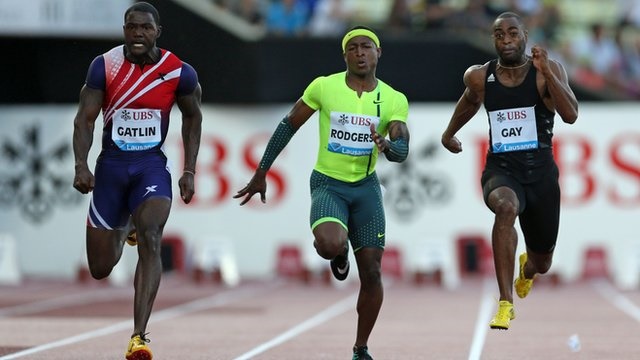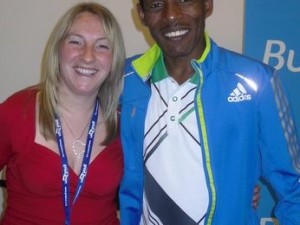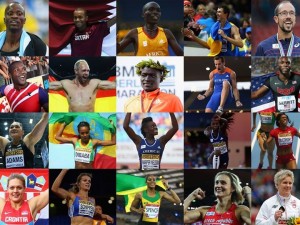
I’d like to start by saying that I am 1000% against the use of performance enhancing drugs in the sport that I love – in any sport for that matter, professional or otherwise – and I must emphasise that my views do not represent those of the governing bodies, organisations, publications and athletics events that I work for.
I woke up this morning feeling compelled to write about last night’s men’s 100m event at the Lausanne IAAF Diamond League.
It was a non-Diamond League discipline in the Swiss city, yet it attracted more opinion, outrage, column inches and media coverage like no other.
The results were: 1) Justin Gatlin, 9.80. 2) Tyson Gay, 9.93 and 3) Mike Rodgers. 9.98.
I tweeted the above picture late last night and this morning, I was startled to wake to countless retweets and comments.
Marathon world record holder, Paula Radcliffe – herself, a passionate anti-doping campaigner – spotted my tweet and within minutes, my phone was beeping at a constant with replies of anger and interpretation.
Even now – at 1:30pm in the afternoon – I’ve had to switch my phone to ‘silent’ in order to concentrate on writing this, for the reaction to the proceeding evening’s race has created much furore and judgement within the athletics community.
‘Sour taste’
For those of you who did not see the Lausanne 100m, let me offer you an explanation.
The sole purpose behind such an incredible response to a single race lies with the men who crossed the line in the top three positions – Justin Gatlin, Tyson Gay and Mike Rodgers.
The American threesome have all returned to world-class competition following the service of a drugs ban, and the fact that all three have resumed to their winning habits – collecting prize and appearance money, sponsorship and media attention along the way – has understandably left a sour taste in the mouths of athletics aficionados.
Indeed, watching this trio of cheats speed down the track is not an easy thing to do but as much as I despise saying it, we must face the reality – these big-name attractions get bums on stadium seats and fans in front of their televisions and ipads, in spite of their past misdemeanours.
We’ve had four years to adjust to seeing Gatlin – the 2004 Olympic champion – back in action from his four-year ban and 2014 certainly seems to be his year, following nine dominant victories on the international circuit this summer – including the Shanghai, Eugene, Rome and of course, Lausanne Diamond League meetings.
With an impressive 9.80 season’s best, the 32-year-old 2005 world champion is running as fast as he’s ever been, prompting many to question the long-term PED benefits that these men are profiting from.
The two-time world indoor 60m champion – like Great Britain’s Dwain Chambers – is known for his assistance with the anti-doping authority’s investigations, but unlike the charismatic Londoner who appears to have been welcomed back into British and international sprinting fold by the majority with open arms, many believe that Gatlin is doing himself no favours with his arrogant swagger and refusal to admit and apologise for his wrongdoings.
Rodgers, meanwhile, is another example of an athlete who fails to endear himself to the sport.
The 29-year-old world 4x100m relay silver medallist served a nine-month ban for failing a drugs test in 2011 and it pains me to say that a lot of people have seemed to have forgotten this.
‘Back with a bang’
The biggest story of the night, however, was the participation of Gay.
It was somewhat poetic that his last competitive appearance was in Lausanne twelve months ago when he stormed to a 9.79 win, and it was a brave – and dare I say it, clever – move by the Athletissima meeting to invite him to make his highly-anticipated comeback at their event.
‘Highly-anticipated’ implying our curiosity towards the sort of form one of the sports’ most hated men would be in, combined with the well-marketed head-to-head match-up against Gatlin, the modern-day equivalent of Ben Johnson – the disgraced Canadian sprinter who was disqualified for doping after his 1988 Olympic title.
Yes, as much as we hated it – just like Gatlin before him, Gay was back and back with a bang.
The 31-year-old was the archetypal role model of world sprinting before his scandal broke last summer.
A world 100m and 200m champion from 2007, I sat down with Gay for a one-to-one interview in Manchester back in 2011 and he spoke as he usual god-fearing, modest and respectful self.
I even recall wishing he’d inject a bit of personality into his demeanour as I struggled to hear his quiet voice as I played back my Dictaphone, but as the saying goes – ‘be careful what you wish for’, as he evidently became tired of playing second fiddle to his fierce rival, Usain Bolt – the Jamaican triple Olympic and world champion and world record holder – both on and off the track.
I used to feel sorry for Gay when the press would instantly bombard him with questions on his Caribbean counterpart, and I remember vividly as I said to a colleague in the London in 2012 that I’d wished Gay would have beaten Gatlin to the bronze in the Olympic final – oh the irony now.
‘It’s fascinating what desperation can do to a man’
When the news broke of Gay’s – and Asafa Powell’s to boot – positive test last July, I was working at the IAAF World Youth Championships in Donetsk, Ukraine and I have a vivid recollection of feeling fearful of the reaction of the impressionable 16 and 17-year-old’s around me.
How would they cope with the news of their role model’s shocking demise?
Gay’s positive finding for a banned substance – of which he admitted but blamed it on an unspecified third party – resulted in both him and Gatlin being stripped of their 2012 Olympic 4x100m silver medals.
Suddenly, Gay’s frustrating shyness was attributed to guilt all along.
I find it’s fascinating what desperation can do to a man.
One hopes that Gay’s 13-year-old daughter has been shielded from the wrath directed towards him, and although Gay appeared solemn and understandably embarrassed last night, he claimed he felt welcome on his return.
Indeed, his sponsors, adidas have signed him back on their books after suspending his contract during his one-year ban and Gay – like Gatlin, who at one point faced a lifetime ban before it was overturned – is fortunate that his suspension was reduced from two years in exchange for his cooperation with the US Anti-Doping authorities.
The two biggest questions on the lips of many in the past 24-hours seem to be what, if any amount, was Gay paid by meet organisers as he apparently continues to repay his ill-gotten gains?
And which competitions will next be unable to resist the urge of a Gatlin V Gay draw in order to maximise their profits and television ratings?
On a final note, I must say thank goodness we are not in a major championships year – but there’s a strong chance we will all witness Gatlin and Gay motor their way on to the medals podium in Beijing at the IAAF World Championships next August and perhaps they will power on to the Rio Olympics in 2016 – only time will tell.
The whole affair is a very sad tale but needless to say, it’s a story that sells the sport – I just sincerely hope that welcoming these men back is not at the complete expense of athletics’ credibility, for we must all focus on the hundreds of clean, talented men and women who represent the sport with the grace and dignity that we should all be proud – and relieved – of.
*I must reiterate again that my views do not represent those of the governing bodies, organisations, publications and athletics events that I work for.
1 Comment
-
I think it is a great shame that money and other pressures have let to the reversal of previous policies against the participation of drug cheats in Diamond Leagues etc. Any money they win it at the expense of clean athletes


